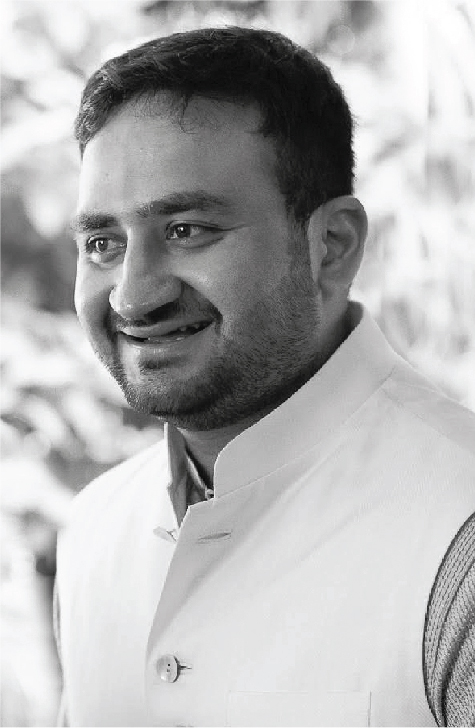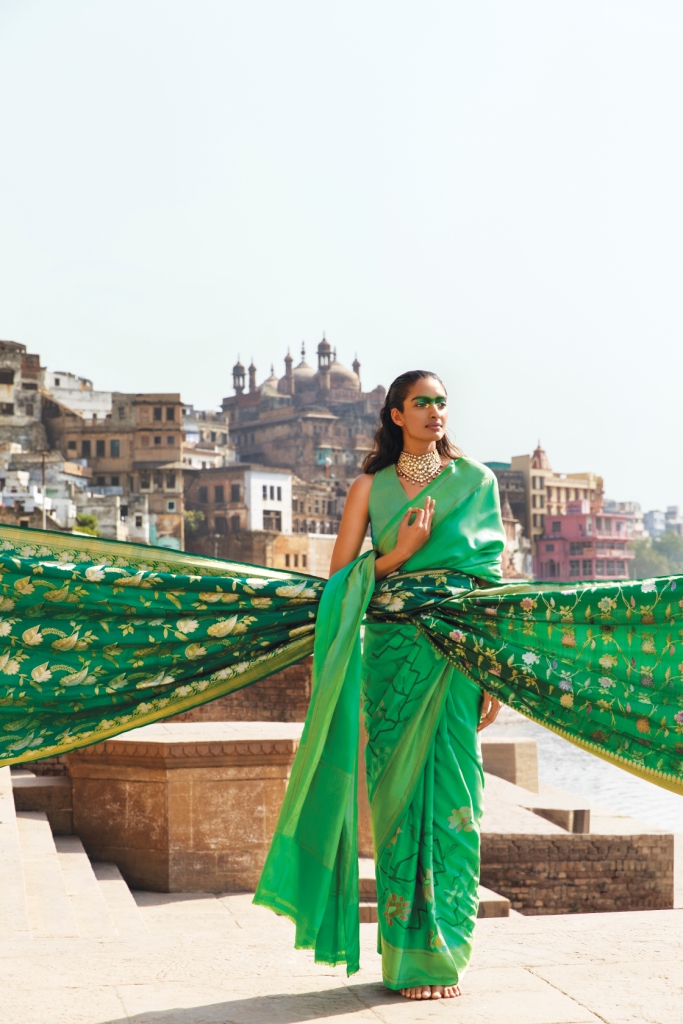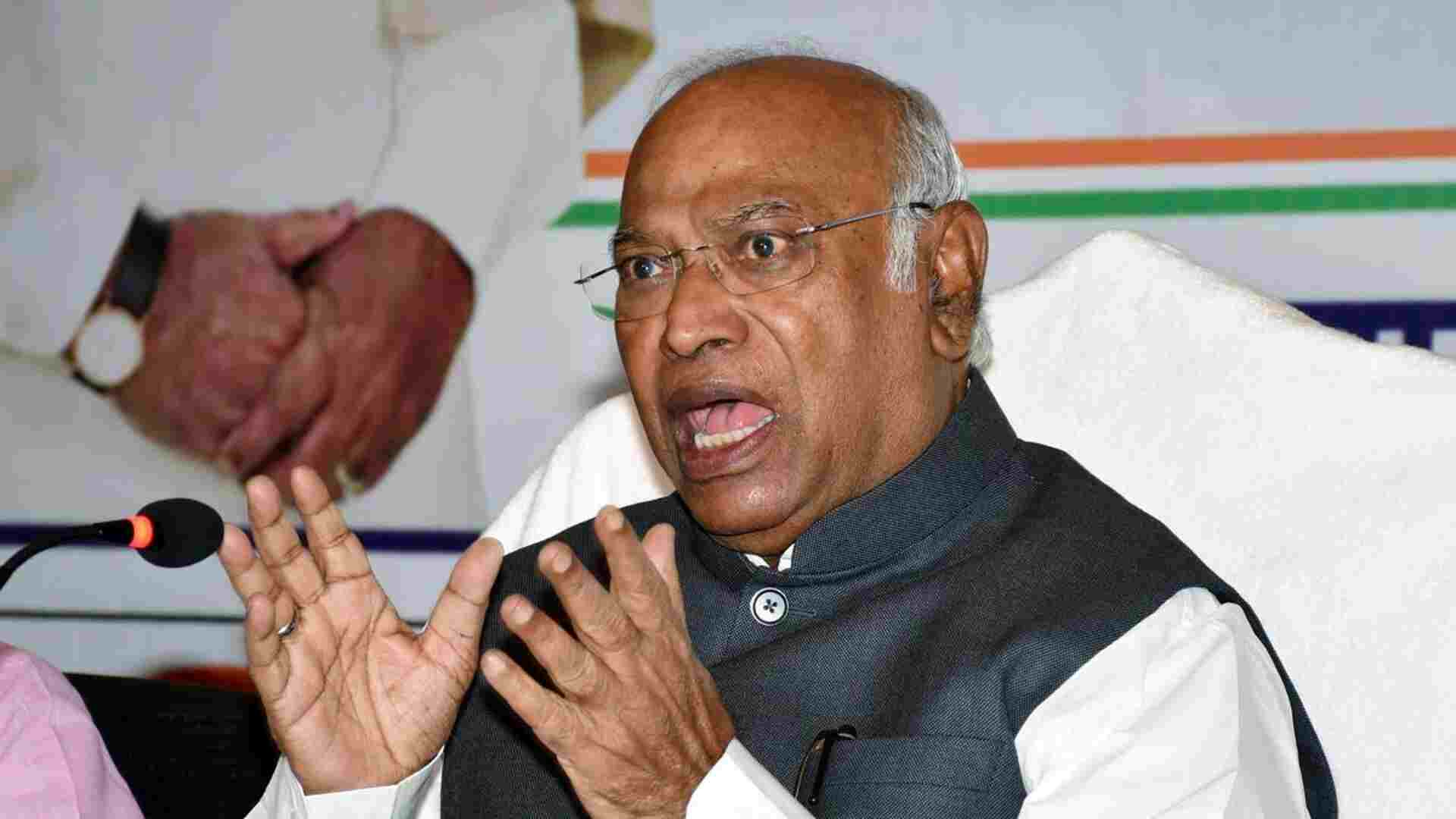
Benares is older than history, older than tradition, older even than legend, and looks twice as old as all of them put together.” —Author Mark Twain, on Varanasi
The Assi Ghats of Varanasi are lyrical, mystical and mythical. As you tide across them in a hand-rowed boat, all you see are magnificent havelis and ashrams built by erstwhile maharajas, rich merchants and the landed aristocracy for their old and ailing to live in and look for eternal peace. Many of the leading Indian families lived in these homes and, whilst there looked for the finer things of life to fill their home with.
The women of the household began working closely with the local silk weavers to create masterpieces for their own use and to gift to their loved ones. Voila were born the kin khwabs, the brocades, the tanchois and the gold weaves. In short, a legacy we all know today as a Banarasi weave which became part of the Indian heritage fable. No trousseau was complete without an addition of a tanchoi or a brocade from Varanasi.

It was only in recent times that many brands emerged from this ancient town, making Banarasi silk a member of the haute couture club. The Daily Guardian catches up with one such brand, Shanti Banaras, which is two-generation old and has crafted masterpieces for many renowned brands before it flagged off its own well-orchestrated label, Shanti Banaras.

Led by Amrit Shah, Shanti Banaras adopts entire villages of weavers and employs them to work on designs that they create. And it is in these Covid times that both Amrit and his studio have shown exemplary patronage by nurturing their weavers, feeding their families and not cancelling a single order.

While talking about the plight of hand-made luxury post-Covid, Shah fears it will take a severe beating and be last on the priority of spends, especially in the scenario when festivities of all kind stand postponed. Excerpts:
Q. What is the impact of Covid-19 on the domestic market of handwoven textiles?
A. Handwoven textiles are a luxury product and when the times are tough, the consumer may restrict themselves completely or partially in indulging in acquiring such highvalue items. The postponement of weddings and the mentality to spend less on luxury products will take a toll at the handwoven sector.
Q. In the list of luxury items, will the hand-made score at the lowest?
A. Well, there is another school of thought on this topic which says that the consumer that is aware of handlooms shall still continue to invest in it. And based on the historical consumer demographics, handloom customers are usually in the rich strata of the society and may continue to have the spending power. Although there may be certain postponement, but the industry will get back on its feet.
Q. How will it impact the looms of Varanasi?
A. The impact on the looms is drastic due to an immediate slack after the lockdown is over so there may not be any immediate work as the production in hand will have to move first. This may be a hard time to sustain the looms and their artisans. It may also lead to production of lower value and commercial products.
Q. How should the textile Industry move forward post the lockdown?
A. It’s a very icy road post the lockdown and we need to step very carefully. We need to sustain the people working with us and improvise and give something new to the market. The process of business is going to change, there’ll be more planning to consumer tastes with precise production for the precise customer. There’ll have to be greater efforts made to woo the customer back into the right mindset. If at all the levels everyone pushes then only the engine will kick start again.
Q. Will the depression lead to precedence of power looms over hand looms?
A. The weaver might make that shift for making easier money. The buyer might be tempted. But the real connoisseur will still look the pleasure of wearing something woven by hand. That happiness in unparalleled.
Q. How do you think the policymakers/ government can help at this time?
A. There are great efforts that have been put by the government to maintain positivity and help the weavers during the lockdown, but once it opens they rely solely on the companies they have been associated with. I feel that a relief on such companies with taxes and incentives to promote and produce textiles shall help the industry overall. Although thinking practically, this may not be possible for the government as this is a hard time for everyone. So just the positive spirit and to ensure a healthy environment for us to work, rest we shall fight this and get back on our own.
Q. The wedding markets will be at an all-time low post-Covid. How will that affect the textile industry?
A. The weddings have been postponed and those that may continue will have less spending and fewer guests. Since the handloom saree sector majorly depends on events and marriages for the majority of its sale, this may have a scarring effect on the industry. Yet, most of them are postponed till late November, December so in turn the market may lift itself during those times. We have to wait and see if the postponement leads to better results that time.
Q. What is Shanti Banaras doing to support its master weavers?
A. Our organisation is involved with over 1,500 master weavers and process leaders who in turn employ a total of 10,000 people. We have made small payments even during the time of lockdown to our weavers and others who have been calling us for help. We have paid our salaries in full and given positive assurance to all that even in the future we shall work together and overcome, “whatever may come in the future”. Apart from that, we have been distributing rations via our weavers to the poor living in their locality. And to auto-wallas and other people who have been associated with us. Tough times call for tough measures laced with kindness and at the end of the day all that the weaver wants is work and money for raw material and we have ensured both.















